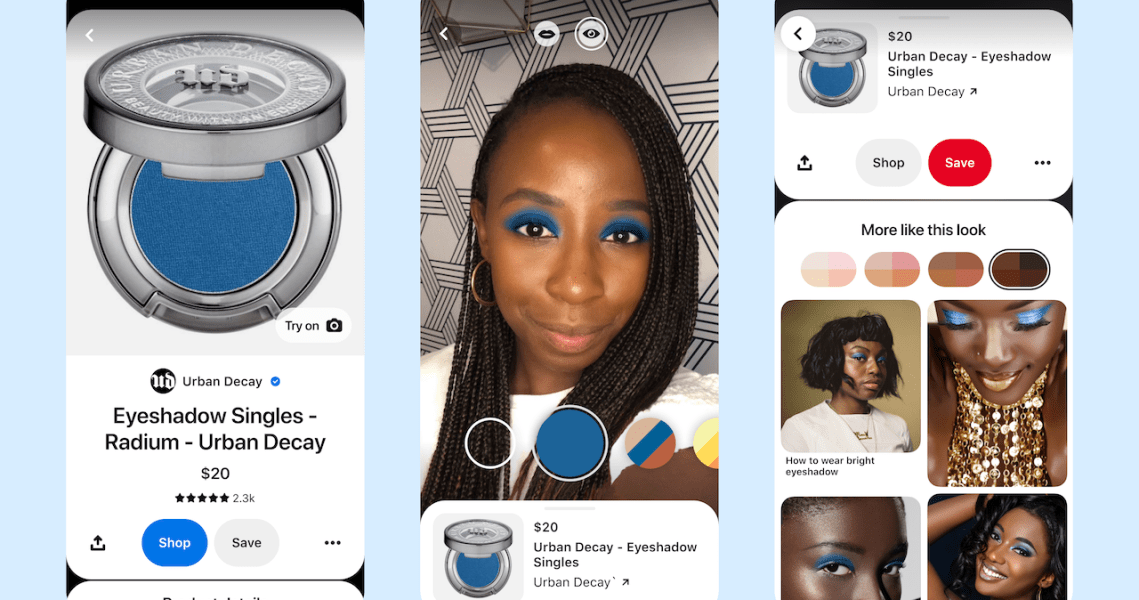With a combination of AR technology, influencers and brand partnerships, Pinterest is building up its credentials as a social destination for beauty.
The platform’s launch of its AR eyeshadow try-on tool last week was the latest in a range of beauty developments over the past year. Throughout 2020, the company has introduced a range of features, including AR lipstick try-on, a skin-tone finder and tools to boost influencer content including Story Pins and creator profiles.
“Beauty and style are some of our fastest-growing verticals,” said Aya Kanai, Pinterest’s head of content and creator partnerships. Previously the editor-in-chief of Marie Claire, Kanai joined Pinterest in October 2020 to boost the platform’s beauty and fashion content.
The platform is working to amplify its beauty content, and searches for Gen-Z friendly makeup trends have been on the rise over the past year. In 2020, searches for the term “pastel eyeshadow” grew by 12 times, while other popular terms have been “crazy eyeshadow” and “sunset eyeshadow,” which both saw fourfold growth. Searches for “butterfly eyeshadow,” meanwhile, doubled.
According to Kanai, Gen Z and men are the two fastest-growing cohorts on Pinterest for beauty and style. Gen Z is especially drawn to Pinterest, she said, for their “focus on all things aesthetic.”
The new AR try-on tool for eyeshadow features a range of major beauty brands like Urban Decay, Pat McGrath and Fenty Beauty. Like with the lipstick try-on predecessor, users can click a link to purchase the product at the bottom of the try-on. Most brands link to purchase at Sephora, while some such as Lancôme and YSL Beauty link to purchase on their DTC sites.
Unlike Instagram with its checkout tool, Pinterest’s approach to social commerce is focused on linking to purchase outside the platform. The platform does not currently have plans to have its own checkout feature.
“The most important thing about Pinterest as a platform is for us to be the home of inspiration, the home of your next best idea,” said Kanai. “Inspiration often leads to shopping.” In 2020, the platform saw a 350% increase in product catalog uploads by brands, which was driven by both pandemic-related store closures and its integration with Shopify announced in May 2020.
The company is continuing to build its shopping features, after announcing a new design for its product tagging tools in October. According to an announcement on its site, it plans to launch product tagging for influencers on their Story Pins “in the coming months.” It also launched a beta version of product tagging for brands’ ads.
Pinterest is part of a growing number of major tech companies betting on AR try-on in beauty this year, along with Google and Snapchat. The beauty industry’s interest in the feature has skyrocketed due to the pandemic’s effect on product testers.
Kanai noted that the goal for Pinterest is to keep the AR try-on “close to actual reality,” without creating special filters for the face or altering a person’s look.
AR try-on as an actual replacement for in-person testers “has a long way to go,” said Tiila Abbitt, the founder of Aether Beauty. The brand features its Joshua Tree Desert Matte eyeshadow palette in the new Pinterest AR feature with a link to purchase from Sephora. Abbitt said that she views the feature as more of “a cute marketing angle for brand awareness,” rather than a sales driver. “Right now, there are a few virtual AR try-on platforms and they basically all look the same,” she said, stating that the technology needs to improve in opacity, texture, shimmer and 3D appearance.
“It’s better than nothing, but it has never made myself or anyone that I know purchase a product,” she said. “If anything, it’s just fun to play with!”




